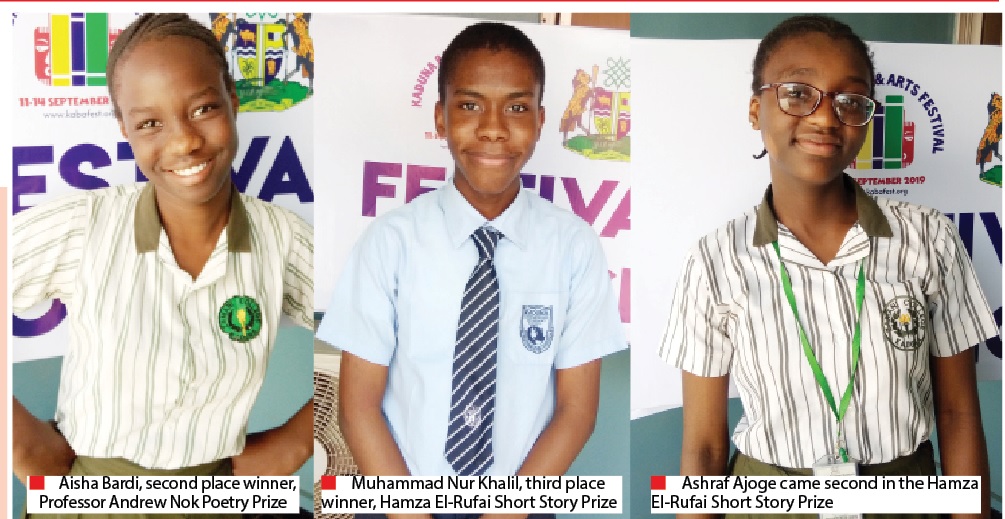How Kaduna teens wrote award-winning pieces
On September 11, during the opening ceremony of the Kaduna Book and Arts Festival (KABAFEST), six teenagers received awards for their poems and short stories. What was their writing process like, and what inspired their works? Bookshelf finds out. In Kaduna, the Yasmin El-Rufai Foundation is fast becoming the ‘go-to’ place for teenage writers and […]

On September 11, during the opening ceremony of the Kaduna Book and Arts Festival (KABAFEST), six teenagers received awards for their poems and short stories. What was their writing process like, and what inspired their works? Bookshelf finds out.
In Kaduna, the Yasmin El-Rufai Foundation is fast becoming the ‘go-to’ place for teenage writers and bookworms. Established in 2013 by the state’s first lady, Mrs. Hadiza Isma El-Rufai, in memory of her late daughter, Yasmin El-Rufai who had a great passion for literature, it runs a creative writing program for schoolchildren which gave birth to the Hamza El-Rufai Short Story Prize and the Professor Andrew Nok Poetry Prize.
Okwori Ihotu, from a shortlist of seventeen, emerged winner of the short story prize for her story ‘It Begins with Us,’ about Maimuna, a girl forced into marriage. “My stories are based on happenings around me, particularly what affects girls and women all over the world,” she said, adding that she was excited when she was announced winner for the effort. “I am honoured because it’s a privilege. I feel like it has given me the opportunity to become a better writer in the future.”
Thirteen-year-old Zamani College’s Ashraf Ajoge, who came second, said she was surprised and delighted all at once because the win was unexpected. Her story, ‘The Diary of Kennedy,’ was triggered by the number of suicides recorded in Nigerian universities at a particular time. “It was almost a daily thing. Every day I wake up my mum tells me about someone who committed suicide, so I decided to write about it in order to create awareness.”
Ashraf described her writing process as challenging because of the kind of research it involved. “I had to read up about people who committed suicide. I read their stories, what they shared in common and used what I gathered to create Kennedy,” she said, adding that the process wasn’t fun because the stories were tragic.
However, Ashraf felt connected to her work and the need to let people know what those who commit suicide pass through.
“People usually blame those who commit suicide, when actually it is the fault of those around them. If they had been given enough attention, their change in behaviour would have been noticed,” she pointed out.
Another surprised winner is Muhammad Nur Khalil, 15, who came third place in the short story category. Titled ‘End,’ his Star Wars-inspired piece is about an invasion of earth by aliens. “I don’t really find anything, apart from Sci-fi, interesting,” he said.
A student of Kaduna International Secondary School, Khalil, first discovered his love for writing in a Junior Secondary 2 English class. Their teacher asked them to write and he chose the science fiction genre.
Khalil’s major challenge in writing ‘End’ was the actual writing. “It was quite tasking. I had all the ideas, but putting it on paper was the problem,” he explained.
Eighteen-year-old Aisha Kabiru Muhammed, a 200 Level Law student from Ahmadu Bello University, Zaria, emerged winner of the Professor Andrew Nok Poetry Prize.
Aisha told Bookshelf she writes to create places and non-existent worlds. “My writing is an escape. I do it to inspire and tell stories that need to be told. I feel everyone has that responsibility. I feel like I have a responsibility to tell my story and try as much as possible to tell other people’s stories,” she said, adding that one of her poems, ‘Fragile,’ talks about hustling to make a living, which she explains is the Nigerian experience. “I feel every Nigerian is a fighter with a fighting spirit.”
Another of Aisha’s piece, which focuses on women, was inspired by a Chinese proverb which says ‘women hold up the sky.’ “I believe women are strong even if we are seen as soft,” she said.
Second place winner in the poetry category is Zamani College’s Aisha Abdullahi Bardi, 13, had felt propelled to write the best poem she could from the depth of her heart. She explained that a health three-day workshop at the Yasmin El-Rufai Foundation helped in the development of her poems. One of such poems was titled ‘Suicidal,’ which explored betrayal among loved ones and friends.
Another of Aisha Bardi’s peoms, titled ‘Culture,’ was triggered by her love for understanding diverse ways of life. “I love every culture and try my best to learn as many as I can,” the JSS 3 student explained.
Bello Faiza took third place for her three poems, ‘Lost in Me,’ ‘I Was Born,’ and ‘Silent Scream.’ The 17-year-old, who just rounded off her secondary school education from Queens College, Lagos, explored issues relating to being born into the world, the power of a woman, and rape.
Faiza started writing when she was seven. “I like telling stories. I am not very good at talking with people and the best way I could express myself was through writing,” she said. This was how she started writing short stories.
Along the way Faiza had a mentor who advised her to try writing poetry. She did, and the experience has been good. “Winning encourages me that my work is good enough,” she said.
Top winners of both the Hamza El-Rufai Short Story Prize and the Professor Andrew Nok Poetry Prize got a reward of N100,000 each, while the second and third place winners went home with N30,000 and N20,000 respectively.
